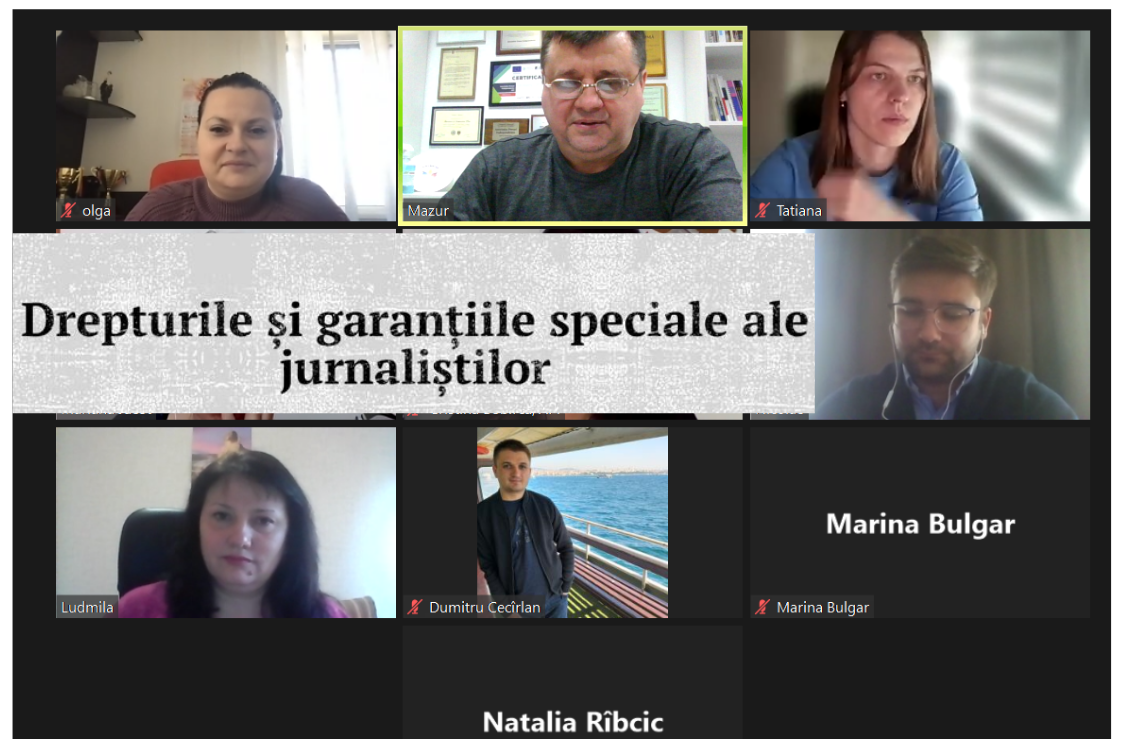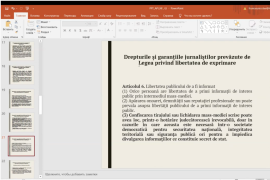back
Journalists Trained In How To Defend Their Rights If Intimidated Or Prevented From Working

Zoom.us capture
Local and regional media journalists do not have sufficient legal knowledge and do not know how to defend their rights, especially in situations where they are intimidated or prevented from working. During the online workshop "Special Rights and Safeguards for Journalists," lawyer Nicolae Frumosu provided journalists with information and advice on how to defend their rights, including in court. The training held at the end of February was attended by journalists from the beneficiary newsrooms of the Center for Consulting and Assistance to Regional Independent Media Outlets.
In the first part of the training, the legal consultant reminded the participants about journalist rights and obligations, methods of defense, sanctions provided in the Criminal Code for crimes that endanger freedom of expression, etc. Journalists enjoy special rights and safeguards to obtain and disseminate public interest information, to participate in court hearings, to report from areas of military conflict or natural disasters, etc. However, in their professional work journalists increasingly face intimidation by people holding public offices or are prevented from performing their duties. Lawyer Nicolae Frumosu specified that, for such situations, the Criminal Code provides for fines between 25000 and 32500 lei (500-650 conventional units) and if cases or threats of violence are found, the fine is higher, up to 67500 of lei. Similar penalties are provided for censorship. "Unfortunately, when their rights are violated, journalists prefer to make such cases public but they rarely go to the police or to court. I remember a journalist who asked us for help due to having been intimidated by an official who was targeted in a media story. Although we initially agreed to file a criminal complaint, the journalist later changed his mind. My advice is not to leave people who commit abuse unpunished, because if they are not punished, they may do it again,” N. Frumosu said. The easiest way for journalists to defend themselves is to file a criminal complaint with the police or the prosecutor's office.
According to Svetlana Cernov, journalist for Est-Curier newspaper in Criuleni, said that journalists often lacked knowledge on how to act against those who abused power. "A few years ago, the country’s president came to visit Criuleni. Although we complied with all the requirements set by the presidential institution, the bodyguard restricted our access, forbade us to take pictures or to ask questions. We informed our readers about this incident, but that was the end of it, we did not have time to file complaints," S. Cernov added. Olga Popa from the SP newspaper from Bălți mentioned that the newsroom’s journalists were intimidated a few times after publishing their stories: “A lawyer threatened she would put us in prison after we published images with her son's car rallying around the Christmas tree in the center of Bălți. She complained to the police that we had published her private data, although we left only the registration number of the car uncovered. The police sent the complaint to the Center for Private Data Protection, and this institution informed us that we had not violated the law because the public interest was more important than those data. In response to the lawyer's threats, we filed a complaint with the Bar Association, but after reviewing our complaint, they told us that the lawyer had not done anything wrong." Nicolae Frumosu considers this behavior of the lawyer abusive and believes that the lawyer should have been sued and the court might have required the Bar Association to start disciplinary proceedings against her.
In the second part of the training, the participants looked at other important topics for journalists: protection of information sources, media interference with the right of public persons to privacy, impediments to access to information, media accountability for taking over false information, etc.
Full workshop recording is available HERE.
Since July 2020, when the Consulting and Assistance Center was relaunched and to date, API has conducted other 18 thematic online and offline trainings, attended by over 336 media staff.
API member newsrooms and regional media outlets which are not API members but meet the minimum criteria of editorial independence and professional integrity may request the Center’s services by accessing the application on the webpage www.api.md.
The project "Continuation of Assistance Program for Independent Regional Media" is implemented by the Association of Independent Press (API) and funded by the US Embassy to the Republic of Moldova. The views expressed within the project belong to the authors of the project and do not necessarily correspond to those of the US Embassy.
